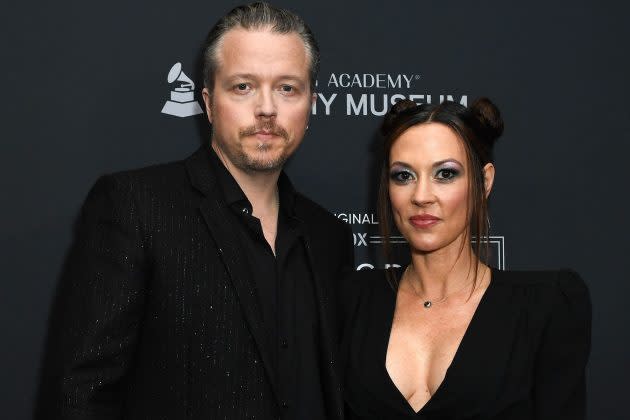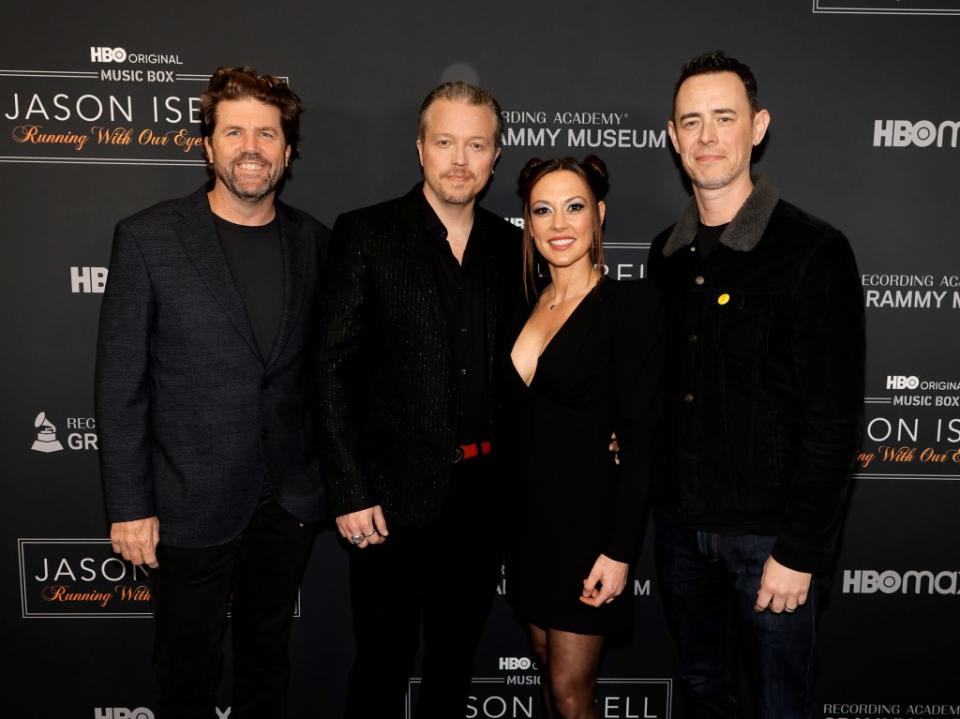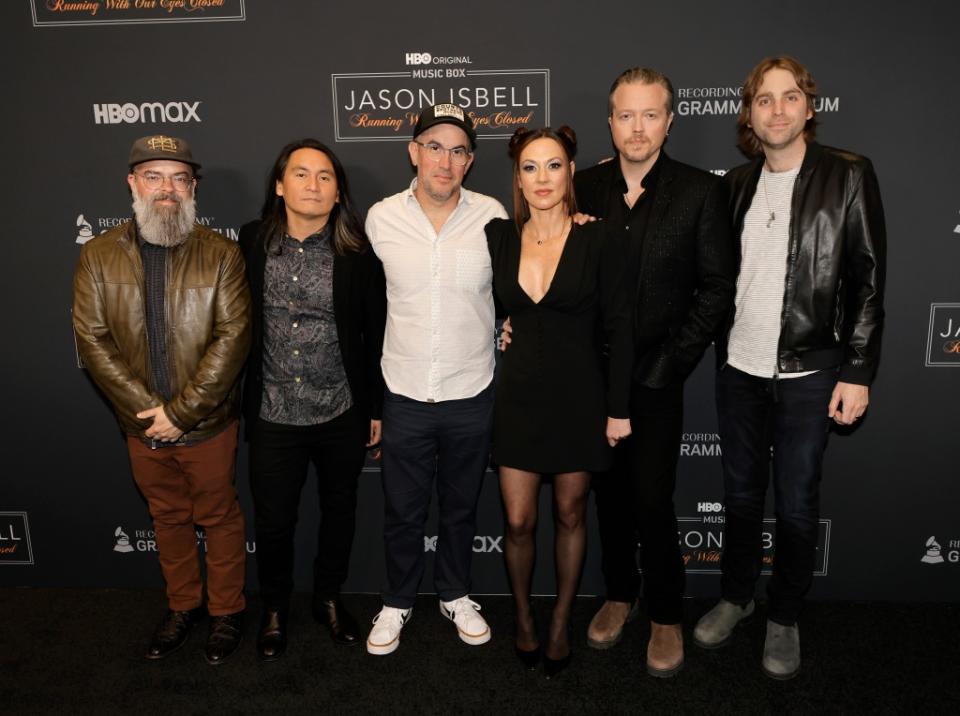Jason Isbell on Being ‘Unnerved’ Watching HBO Doc That Candidly Covers His Recovery, Marriage, Studio Intensity
- Oops!Something went wrong.Please try again later.

While most contemporary music documentaries fall into the realm of self-produced hagiography, no one will be making that charge about “Jason Isbell: Running With Our Eyes Closed,” a clear-eyes/hearts-full documentary coming from HBO Max documentary that had its world premiere at the Grammy Museum.
At a Q&A with Isbell and director Sam Jones following the screening of the film, which begins streaming April 7, moderator Colin Hanks, a big Isbell fan, asked the doc’s star: “What was it about this that made you go, ‘Yeah, I’m gonna do a doc,’ and really make yourself a little bit more raw than maybe you had even in your songs?”
More from Variety
'It' Prequel Series at HBO Max Casts Taylour Paige, Jovan Adepo, Chris Chalk, James Remar
Warner Bros. Looks to Close Deal for 'Harry Potter' HBO Max Series
“It’s because I didn’t know what was about to happen,” responded Isbell. “The whole reason I did this was because I was not informed of the consequences of doing this.” He was half-joking. “I just told Sam before we walked over here: Nobody was gonna make a movie about me that was gonna be easy for me to watch. That was not gonna happen. So I’m just glad he made a good one.”
Talking with Variety before the film unspooled at the March 23 premiere, Isbell was also candid about the movie’s candor. Asked about how it felt to look back now on some intimate events of the past that are covered in the film, Isbell said, “You know, I don’t love it. I think the movie’s great, and I love the movie, and I think if it was not about me, I would be really way into it. But it’s strange because usually I share a lot with my audience, but that’s all stuff that I get to edit and I get to control. And so I would be lying if I told you that it wasn’t unnerving.
“But either you make a documentary that you’re completely comfortable with, or you make one that’s worth watching,” he continued. “You know, there’s not really a whole lot of in-between. So I would rather make one that’s worth watching than one that makes me feel warm and fuzzy.”
Actually, most viewers will probably find “Running With Our Eyes” closed to be a warm viewing experience, if not riddled with fuzz. Jones’ doc captures Isbell, his wife Amanda Shires and band the 400 Unit in and around the 2019 recording of his album “Reunions,” and the odd promotion that followed its release during the early stages of the pandemic in 2020. As the film shows (and the already released trailer strongly indicates), there was some strife between Isbell and Shires as they worked on the recording of “Reunions.” The other area of likely discomfort for Isbell may be a flashback section that deals with his alcoholism during the time he was a baby-faced member of the Drive-by Truckers, leading up to his firing. His sobriety is a well-known and even popularly celebrated thing, which doesn’t negate how worrisome Isbell’s misspent 20s come off on film in video flashbacks and recollections from expert witnesses like Shires and DBTs frontman Patterson Hood.

Jones, the director, found that there were some parallels between this and a previous celebrated film of his, 2002’s “I Am Trying to Break Your Heart: A Film About Wilco.” Both documented the making of what turned out to be important, even landmark albums: Wilco’s “Yankee Foxtrot Hotel,” and, very arguably, Isbell’s “Reunions.” And in both cases, there was unexpected strife that developed in the studio between bandmates as these records came together. The intrigue is greater with the new film because those bandmates are also a married couple. The conflicts that arise — some explored on-screen, some left to the imagination — will have resonance for viewers who are either in a creative collaboration or in a marriage, and most especially for brave souls trying to navigate a combination of the two.
“I think in both cases” — Wilco’s and Isbell’s — “I really wanted to know the process behind the art, and in both cases, in trying to discover that, it turned out to be a lot more of a personal story,” Jones continued. “I was able to see such a personal side of him that I didn’t know he was going to reveal for the camera, and that lined up with the album he was making at that time. So there are parallels in that respect.
“Obviously we didn’t expect the pandemic to be part of the story. But I think for me, the biggest part of it was seeing the generations of Jason in his marriage and working relationship with his wife, but also meeting his family and understanding how he grew up, and the parallels with those two situations and how both those relationships made it into his art.”
Apart from all that, there’s this: Isbell and Shires are both total movie stars, as it turns out, alone or together on screen. But that may not have been the first thought that came to mind as they watched the movie with an audience at the Grammy Museum.
At a reception after the screening, Shires established that it was an uncomfortable sit for her, just as much as it was for her husband. “It wasn’t fun for me to revisit those things. But at the same time, now that it’s over and we played music, the music part felt like a renewal,” she said, referring to an extended performance that she, Isbell and guitarist Sadler Vaden did for the Grammy Museum crowd after the film.
“My hope with the film is that, like with my record” — i.e., her own highly acclaimed solo album of 2021, “Take It Like a Man”] — “somebody might glean from it that, yeah, marriage is hard sometimes, and there are sometimes nebulous, vague reasons that it’s hard — but, I mean, it’s cheaper to stick it out with the one you’re with and fix it than to get a new one.” She paused for that to sink in. “Just kidding.”
No kidding, though: “My granddad always said, ‘Being married is hard’ — but nobody ever let on what was hard about it! Because it feels taboo or like a betrayal to talk about a problem to other people about it,” beyond repeating the maxim. “But I hope that if anybody sees it, they see, oh, everybody has hard times. You choose to go forth and work hard. I hope everybody that sees it knows that nothing’s ever fucking perfect.”
Isbell wants to reiterate that the film covers a lot of ground, not just marital issues. “In the trailer, it’s a lot in a very short amount of time. The whole movie’s not about that. But, yeah, you know, we’ve just celebrated 10 years of marriage, and so that means there was two and a half years after the movie ended that we have still been married for,” he points out. “I mean, the thing is, Amanda and I have been talking about this lately and, you know, we didn’t have a fundamental philosophical difference. We were loyal to each other and we cared about each other. We just were going through the process of negotiating each other’s personality and each other’s growth — and I think, why else would you be with somebody if you don’t want to go through that process with ‘em? I think part of the reason that we sometimes run into trouble is because we care about each other so much. And there are worse things to fight about.”
The film effectively explores how difficult it is to have the stereotypical intensity of an artist while trying to juggle personal relationships amid that concentration.
Asked about how the film portrays his hyper-focus on music, Isbell quipped: “I’m a loner, Dottie.” (Quote via Pee-Wee Herman, of course.) “And it’s not by choice. It’s not because I think it’s cool. It’s just because, I think that’s just the way I am. I have whatever that detachment disorder is. And so, when I was a drinker, I would isolate, you know? Now I try not to do that, and other people encourage me not to do that. But the focus that I have can be all-consuming sometimes when it comes to the work, because I don’t really put a line between my work and my personal life. I think it all feeds itself. So sometimes there can be some damage done.
“I’m sort of perpetually trying to figure out a way to loosen up on those restrictions and widen my focus and still do the same kind of work that I’ve always done, the work that that makes me feel like I’m contributing to creative society,” he continued. “And that’s a struggle. But it’s supposed to be. If it was easy, everybody would do it, like my dad says.”
The film has a celebrative last act, in spite of — or because of — all the issues that come up along the way. Meanwhile, for Isbell fans, there will be a lot to celebrate this year, including a new album, “Weathervanes” (out June 9), a tour, this doc and, intriguingly, a featured acting role in Martin Scorsese’s new film, “Killers of the Flower Moon” (which has a just-announced October release date).
“There’s a going a lot going on,” he agrees, as an understatement. “It’s been 22 years since I first started touring, and I’m 44 now. So it feels like a good time to sort of push while I still have my wits about me, and do as much work as I can. I’m proud of the album that we made, and I’m proud of the Scorsese movie, and I’m proud of this movie. So I think that’s what really makes me excited, the fact that I think it’s all good work.”
At the Q&A with Hanks after the screening, Isbell noted that it wasn’t just him and Shires that were a bit uneasy about putting their lives on screen. After thanking everyone who worked on the doc, he gave a shout-out to one of the film’s interviewees, in particular: “Thanks to my mama,” he said. “She hated that shit. She was terrified.”
But he reiterated felt the film was worth the trouble. “I feel like maybe this is another way that I can use the the story that I have in my life to connect with people who need that connection. … In songs, the more honest you are, the more of a secret it feels like, that’s why I write sometimes very specific things — because I think whoever does hear this and whoever this does connect with is gonna think, ‘How is this, that this person knows this about me?’ And I think the movie works for that goal also— when it lines up in the right way, it opens your heart up like nothing else can do, from a vague, controlled distance. … You can’t be brave unless you’re scared. Otherwise, you’re just doing something that’s easy for you.”
Isbell put his faith in Jones because of how much he’d loved his Wilco documentary, “I Am Trying to Break Your Heart.” He even made it sound like it was the non-comic equivalent of “This Is Spinal Tap,” as far as bus video mainstays went. “Every band that I knew, every time we saw anybody on tour, we were watching the documentary and talking about it. That was for a good solid year — all we were talking about was that movie and that story. Over time I got to know Jeff (Tweedy) and Wilco and played with him quite a few times since. I knew Jay also a little bit … That movie was beautiful to me in a very specific way — just beautiful cuz of his honesty. And when Sam wanted to do this, it was like, that makes sense to me because he’s told that story in the right way, even though that was more than 20 years ago.”

Following the Q&A, with Shires adding fiddle (the movie has a comic moment about the difference between fiddle and violin) and Sadler adding a lead guitar, Isbell performed a few songs from his catalog, along with a cover of Townes Van Zandt’s “Pancho and Lefty.” The latter song was called as an audible by Isbell, who told the audience, “Every single night, when Mercy goes to sleep, we alternate nights and one of us sings to her… This is one that on my nights, I have sung to her every single time since she was really tiny. … I think it’s probably the best country and western song ever written. I’m gonna do it in the key of E — the earnest key.”
Isbell enthusastically introduced his own song “Vampires” by saying that they’d just gotten a gold record award for it. “This is one that we can actually hang up in the house,” he said, “because we’ve got some that we’re not putting up. We’ve got some gold and platinum records in storage. Because they’ve got a bad name on ’em, we can’t put ’em up on the wall,” he said, presumably referring to cover versions of “Cover Me Up.” “But this one we can.”
Best of Variety
Sign up for Variety’s Newsletter. For the latest news, follow us on Facebook, Twitter, and Instagram.

